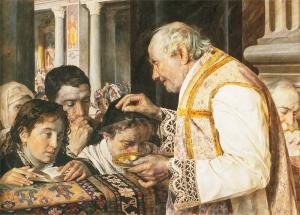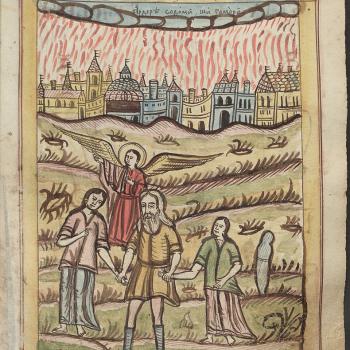
I was raised in an evangelical Christian tradition, one which did recognize the season of Lent. I had heard of it, to be sure, but it was only when I decided to become Catholic did I start taking Lent seriously. And, as I was going to become Byzantine Catholic, I looked into and tried to engage the Byzantine traditions, some of which were quite different from their Western counterparts. Byzantine Catholics start Lent, not on Ash Wednesday, but two days earlier, on Monday (though, technically, it begins with Forgiveness Vespers on the evening of Forgiveness or Cheesefare Sunday). During the time of Lent, the Great Fast, there is no Divine Liturgy celebrated during the ordinary weekdays of Lent; instead, if there is a service to be had, it would be the Pre-Sanctified Liturgy, a Vespers service which ends with the reception of pre-sanctified communion. The Sundays of Lent have various spiritual themes associated with them, which I try to engage every year (through my writings). Traditionally, the Byzantine fasting expectations starts before Lent, beginning two Sundays before Lent with Meatfare Sunday, the last day on which meat was eaten before Easter. The Sunday before Lent, Cheese Fare Sunday (also, Forgiveness Sunday) is traditionally the last day on which the faithful would eat dairy products until Easter. There are also some stricter rules to be followed during various days of Lent, such as the first day being a strict fast, with even oils being forbidden. These expectations are not absolutes, and what is required now is much less (a strict fast day on the first day of Lent, and simple abstinence on the Wednesdays and Fridays of Lent); the tradition concerning the Divine Liturgy, however, generally remains (with only special feast days allowing for the celebration of the Divine Liturgy).
When I became Catholic, I had a rather romantic view of Lent. I understood its purpose, but like many converts, I believed the more extreme my fast was, the more I took on the strictest traditions associated with Lent (even if they were monastic traditions not always meant for the ordinary person), the more I would gain from Lent. This slowly gave way to a more realistic understanding of Lent, where I found what was important was not the strict observance of particular rules, especially ancient ones which were not required today, but the spirit of the fast. Lent is meant to help us transcend ourselves so that, by a proper engagement of Lent, we hopefully would become better persons, and not just during Lent. That is, Lent should not be about the pursuit of some extreme discipline for the glory one hopes to attain for following that discipline, but rather, finding a way to become a more just and charitable person. The romanticized version of Lent, where people seek to outdo each other in engaging extreme ascetical practices (without proper spiritual direction), undermines the purpose of Lent as it turns the time into a time for pride and vainglory. For this reason, I have long determined that the key to Lent is to try to become more charitable, as well as to work for the better establishment of some element of justice in the world, using various spiritual disciplines, including spiritual reading, as the means to promote such an end. I keep what is expected of me from my tradition, the obligations which have been set, but I am more concerned with my reading, and putting what I read into practice, than I am with fasting itself.
It is the need to focus on our own personal conversion, the need to become better, more charitable, more just people, which is at the heart of the Great Fast. Lent is not meant to be a time in which we put on a show of holiness, presenting ourselves to the world with acts of piety, especially if we otherwise are focused on activities which counter the charity and justice which we should seek after during Lent. This is why, when I see various Catholic politicians with ashes on their forehead on Ash Wednesday going onto news programs to promote governmental actions which aid the rich and powerful by denying the poor and the oppressed what they need, I view such politicians are hypocrites, putting on a show, engaging the externals of Lent while denying its true spirit in their lives. They are hoping that their pretense of piety will help hide their despicable actions. It is even worse when, on those news programs, they outright lie about their goals, making promises they will not keep (such as saying the government has no intention to cut funding for necessary services like Social Security, Medicare, or Medicaid) when they know that is indeed what is being planned. They are trying to use religion, and religious piety, as a cover for what will likely lead to great harm (for example, cutting Medicaid might end up having many elderly kicked out of nursing homes with no place to go, that is, render them homeless, while many others who are in medical need will not be able to get the care they need, leading them to die because they are denied the coverage they need). Doing this during Lent, using the cover of Lent to look good and holy while doing such evil shows why it is not the external practices of Lent which matters, but the spirit behind the actions: it is better to avoid the externals of Lent, to even break the basic fasting expectations of Lent, while promoting and doing much for the good of those in need, than it is to engage an extreme fast while undermining the needs of the people. This is something I had to learn, for, as I said, I first took on Lent and the traditions with a kind of romanticism of Lent, the kind which looked more to the externals, but through my spiritual reading, I was able to see through the show and realize the true intent of Lent and why it is better to break the fast than it is to despise the poor and needy.
Now, I still find myself challenged by Lent. I try to find ways to make the time special. I contemplate where I am spiritually, and what I need to do to change, to become a better person. It is not easy. I try to take from and borrow from the traditional expectation of the Byzantine tradition, using them as they best fit my own present circumstance. I try to encourage others to do similarly. Fasting is certainly a way, an important, way, to discipline oneself, as it helps train us to have control over our passions instead of being controlled by them. We learn to think beyond ourselves, and to consider others and their needs. It helps train us to act, even if it is difficult to do what is right. Nonetheless, Lent is more than about fasting. It is about our spiritual journey. It is about discovering ourselves and our relationship with God. We need to do more than fast; we need to pray. We need to do spiritual reading. We need to act, not only doing acts of charity, but with acts of justice, working to make the world a better place, not just for ourselves, but for everyone. If we don’t, what is the point?
* This Is Part XLVII Of My Personal Reflections And Speculations Series
Stay in touch! Like A Little Bit of Nothing on Facebook.
If you liked what you read, please consider sharing it with your friends and family!
N.B.: While I read comments to moderate them, I rarely respond to them. If I don’t respond to your comment directly, don’t assume I am unthankful for it. I appreciate it. But I want readers to feel free to ask questions, and hopefully, dialogue with each other. I have shared what I wanted to say, though some responses will get a brief reply by me, or, if I find it interesting and something I can engage fully, as the foundation for another post. I have had many posts inspired or improved upon thanks to my readers.













